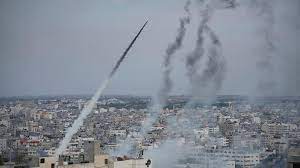
As Israel grappled with a devastating attack orchestrated by Hamas militants, questions loomed over the nation’s defense forces, highlighting significant intelligence gaps that allowed the breach. The incursion saw Hamas fighters breaking through barriers around Gaza and infiltrating Israeli towns, resulting in a tragic loss of civilian lives.
The timing of this attack, occurring on the heels of the 50th anniversary of the 1973 Yom Kippur war when Israeli forces were caught off guard, raised concerns about the military’s preparedness. Retired General Giora Eiland, a former head of Israel’s National Security Council, remarked, “It looks quite similar to what happened at that time.” He pointed out that Israel appeared to have been caught off guard by a well-coordinated assault.
In response, an army spokesperson acknowledged that there would be discussions regarding intelligence preparation in the future but emphasized that the immediate focus was on addressing the ongoing situation.
Israel has long considered Hamas as its sworn enemy. Despite inflicting significant damage on Gaza during a 10-day war in 2021, Israel had pursued a strategy combining incentives and deterrence to maintain stability in the blockaded enclave. This included offering economic incentives, such as work permits for Gazans to work in Israel or the occupied West Bank, alongside a stringent blockade and the looming threat of airstrikes.
For the past 18 months, as violence escalated across the West Bank, Gaza had remained relatively calm, with sporadic cross-border clashes involving smaller groups like Islamic Jihad, while Hamas largely remained on the sidelines.
The Israeli government, led by Prime Minister Benjamin Netanyahu’s right-wing coalition, had consistently underscored its commitment to security and adopted a tough stance against Palestinian militant factions, including Hamas, which has governed Gaza since 2007.
However, when the attack unfolded, Israel’s security apparatus seemed to falter as a sizable force of Hamas fighters, estimated in the hundreds by the military, breached security fences and infiltrated Israeli towns.
“intelligence failure”
Jonathan Panikoff, the former U.S. government deputy national intelligence officer for the Middle East, now affiliated with the Atlantic Council think tank, termed the situation as an “intelligence failure” and a “security failure.” This incident raised questions about the effectiveness of Israel’s previously perceived layered approach toward Gaza.
For Israelis, the sight of lifeless bodies in the streets and civilians being driven or marched into captivity in Gaza was a deeply harrowing experience. The attack resulted in an unprecedented toll of more than 250 Israelis killed and over 1,500 wounded in a single day. The military also sustained significant losses, and Palestinian militant groups claimed to have captured numerous soldiers.
During the attack, gunmen seized security posts, including a police station in the southern town of Sderot, and overran the Erez crossing, a high-security facility responsible for regulating the movement of individuals in and out of Gaza through rigorous controls.
Hamas media circulated footage of fighters navigating through abandoned offices and sprinting past the imposing concrete walls of the Erez crossing.
Former Israeli National Security Advisor Eyal Hulata remarked, “They’ve been planning this for a long time. Obviously, this is a very coordinated attack, and unfortunately, they were able to surprise us tactically and cause devastating damage.”
The fallout from this attack has left Israel’s security forces grappling with serious questions about their intelligence capabilities and preparedness to prevent such breaches in the future.








